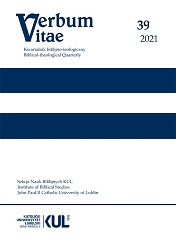Polemiczny charakter wykorzystania greckiego słownictwa misteryjnego przez tłumaczy Septuaginty
Polemic Character of the Use of the Greek Mysteric Vocabulary by the Translators of the Septuagint
Author(s): Paweł LasekSubject(s): Theology and Religion
Published by: Katolicki Uniwersytet Lubelski Jana Pawła II - Wydział Teologii
Keywords: Septuagint; mysteric cults; myrtle; stork; hoopoe; Job 17:6; Job 31:5; Hos 4:12; Hos 10:12; Ezr 2:63; Neh 7:65; Zech 1:8; Zech 5:9
Summary/Abstract: The article provides an analysis concerning the occurrence of some mysteric terms present in the translation of the Septuagint. Greek mystery cults were widely popular at the time when the translation was made. Some parts of the cult were kept undercover. However, the vocabulary, some of the symbols or ideas were widely known to the people, including the Jewish community living in the diaspora of Alexandria. No wonder one can find the words linked to the mystery cults in the Septuagint. What calls one to consider the theme is that some Greek terms linked to the mystery cults in LXX translated the original Hebrew text improperly and thus changed its meaning. Such a situation occurs, e.g., in the book of Hosea where the words light and knowledge appear, whereas the Hebrew text speaks about agriculture, and in the book of Zecharia where the Hebrew word myrtle is translated to mountain and stork to hoopoe. The article provides an analysis of the work of the translators of LXX and the motives of their actions. What can be seen is the polemic with the mysteric cults that is conducted in two ways: firstly, by presenting the mysteric cults and their participants in a negative light; secondly, by avoiding any possible positive associations of the faith of God of Israel with the mystery symbolism.
Journal: Verbum Vitae
- Issue Year: 39/2021
- Issue No: 3
- Page Range: 685-704
- Page Count: 19
- Language: Polish

